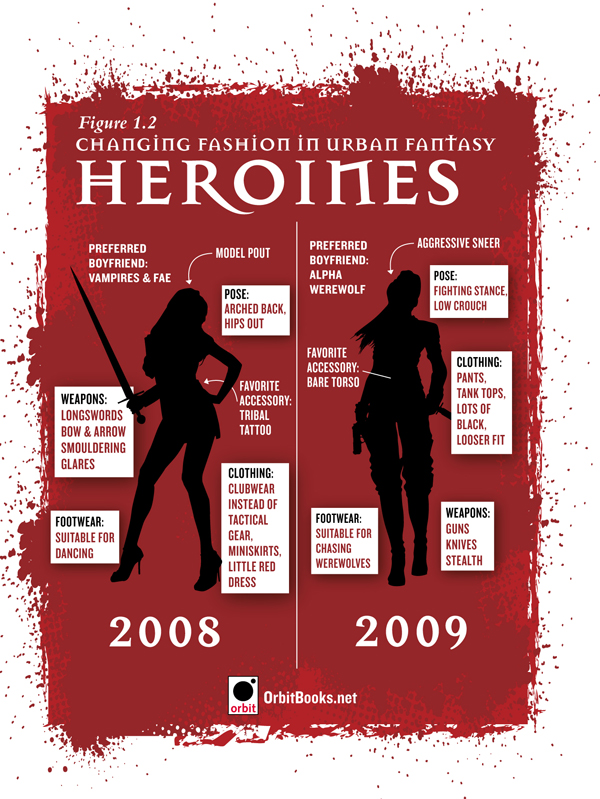Bonus blog today. I figured since I waxed poetic, or at least ranted and pooled information from a lot of other bloggers and websites, about the uneven treatment of genders within genre, I should touch base on Urban Fantasy. This fantasy sub-genre focuses on fantastical activity (werewolves, psionists, vampires, elves, spellcasters, etc.) in a contemporary setting, usually in a big city like New York. Some sub-sub-genres include Historical Urban Fantasy (Thieftaker Chronicles series by D. B. Jackson starring a wizard set in revolutionary Boston) and Suburban Fantasy (Witch Way to the Mall(an anthology) edited by Esther Friesner). Closely related to Urban Fantasy is Near-Future Sci-Fi, where a story is set in nearly modern times but the fantastical elements have a scientific bent.
I love Urban Fantasy, but have found it to be very gender-divisive. While some series are “generic”, for example the Dresden Files series by Jim Butcher and Deadly Curiosities series by Gail Z. Martin, most are either clearly “female” or “male” sub-genres. The female subgenre has romance (or at least heavy sex), usually with two love interests, the woman kicks-ass, rarely needs help, and has magical powers of her own. Nearly all males of the story are defined by their relation to the main character, often portrayed sexy but needing the woman through some mystical link. (An example would be theAnita Blake series by Laurell K. Hamilton.) The male version usually has one female love interest, but the true love is guns and explosives. The stories have lots of violence. The lead character is larger than life, but came from “every-man” beginnings like accounting before magic intrudes on his life. All women are defined in their relationship to the main character, and the first description is not about personal competence but what they look like…how sexy they are. (An example would be the Deacon Chalk Bounty Hunter series by James R, Tuck.)
Both versions have a lot of wish-fulfillment, feature loners, and are unrepentantly sexist. The male version read like old westerns or spy novels and the female versions read like supped-up bodice rippers and, again, traditional spy novels. And everything about them is a guilty pleasure.
Sometimes the authors take the sexism too far. When none of the women in the Male Urban Fantasy have agency (the ability to act on their own) and all exist as sex objects, and the story is basically glorified gun porn, plus the Alpha Male walks over everyone in the story because his mission/opinion is the only one that matters, nothing about the story is likable or identifiable. In the female version of bad Urban Fantasy, when all of the men are weak and let the female treat them like crap, the story is basically self-empowerment of one female who belittles or demeans even her female friends, and magic solves all issues, again the story becomes unreadable.
Am I going to stop reading “female” version Urban Fantasy? Not likely, but then I will also continue to read the “male” version and the “generic” version as well. I enjoy the strong agency of the females in Female Urban Fantasy and the exceptional fight scenes in the Male Urban Fantasy…and the cool magic all around. I do wish more authors could find a way to create a powerful main character without belittling the opposite sex – Ms. Martin and Mr. Butcher in their “generic” versions prove it can be done.
Any comments or thoughts on Urban Fantasy by gender split? Have you noticed the difference? Does it bother you on an emotional or intellectual level? If only one, why do you think it appeals to your emotions/intellect but bothers your emotions/intellect?

Image acquired from OrbitBooks – Link to original here